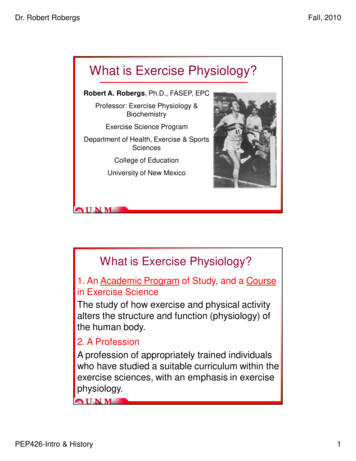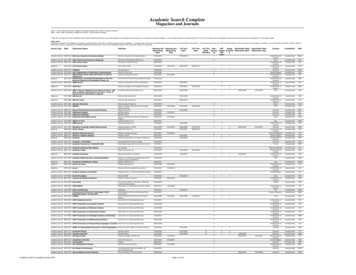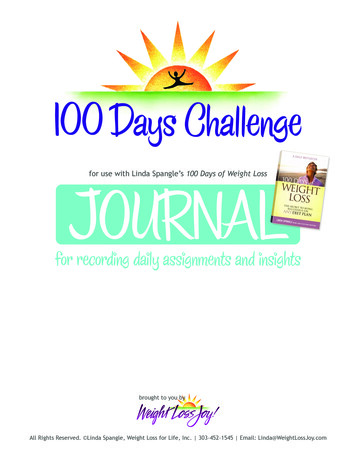
Transcription
THE JOURNALJOURNEY BOOKA short guidebook and journal on how to journal
Name.Journal start date.
By writing and honouring the content of our journals, we becomethe guardians, historians, custodians and inevitable creators of theself, both on and off the page.Jackee Holder
CONTENTSA short history of journal writing . 115 good reasons to put pen to paper. 2How do I make time and space to write?. 5Where’s the best place for me to write? .13How much should I write? . 16Making it past the blank page . 19Some simple writing prompts . 20Writing prompts for more seasoned journal writers . 23Journal juicing exercises . 24Doodle! . 25Hands . 29Lists, glorious lists . 32Do I need to read back over what I’ve written?. 43What do I do when my journal is full? . 46Mining your journal . 49. 55I send you an energetic letter. 63Question time . 68Inner wise self . 74Good thoughts . 78Write to the senses . 81Non-dominant writing hand . 84Writing down the good stuff . 90Smile . 96Water your words . 99How to have closure with your journal. 103Closing words. 111References. 118About Jackee Holder. 119
JOURNAL CONTENTSPage numberTopic/themes
JOURNAL CONTENTSPage numberTopic/themes
JOURNAL CONTENTSPage numberTopic/themes
WELCOME TO YOUR JOURNAL JOURNEY GUIDEBOOK AND JOURNALMy earliest memory of keeping a journal was when my parents gave meone when I was about 12. It was the early 1970s and it was one of thosediaries with a luminous cover and a lock. I remember being cautious aboutwhat I wrote on its pages, preferring to keep many of my secrets safelysecured in my head – our home was a house full of secrets and at thatAs I moved into my teenage years, those secrets became too heavy tocarry in my head and slowly I began the journey of unloading them safelyas I tried to make sense of the chaos and insecurity that marked my lifeat the time.By time I was 26 and had a daughter of my own, I had become a regularjournal writer. I needed to make sense of a relationship that was in ruins,my fears and anxieties around becoming a single mother and the stressmy thoughts onto the page.My pregnancy marked a watershed for me. In a way, I was shedding askin and discovering my own true nature, both on and off the page. Myjournal became a friend, a faithful companion to whom I could safelyexpress and explore my feelings, desires and aspirations without fear ofany comeback.At the time, of course, I was unaware of any research into journaling andmy journal – whether it was a stream of consciousness, emotional ventingor a poem that eased its way onto the page – the simple act of writing, inits own strange way, made me feel better.Fast forward 25 years and, thanks to the wonderful world of research andpioneers like Professor James Pennebaker, we now know that therapeuticand expressive writing – two of the common forms journal writing takes –Journal writing contributes to better sleeping patterns, reduces stress,helps to starve certain types of depression, and can be self-managed.Given its relatively low cost, it makes sense that, in different forms,journal writing is being introduced into medical practices, mental healthorganisations and the mainstream business world across the UK, withmuch success.Personally, I would go so far as to say that journal writing saved mylife during a particularly bleak period for me, as I was approaching myforties. Because of this and the many rewards I’ve gained from thepractice, my journals and I have now become lifelong companions. Theyhave accompanied me through all of life’s emotional and psychologicalterritories and phases, never judging or criticising but remaining aconstant, a place of sanctuary, a place to which I can retreat, a home fromhome whose doorway – the page – is always open.My journal has been the catalyst for all sorts of ideas and ventures,in both my creative and business life. I’ve sorted out dilemmas andcomplex relationship dynamics in her presence. I’ve rejoiced and dancedto celebrations and achievements on her pages. Many of the journals Ibusiness, as I drafted courses and workshops across their pages and intheir margins. My journal has seen me at my best and she has seen me atmy worst and because of this I am a better and less bitter person.I hope this short guide will support you on your own journal writingjourney and inspire you to create and maintain a journal writing practiceof your own.Remember – writing saves lives; and lives are saved by writing! Enjoybecoming a better you through your journal journey.WarmlyJackee HolderDulwich Library27 November 2013
A SHORT HISTORY OF JOURNAL WRITINGPRE-400ADJournals evolved from the earliest forms of diary writing; in Ancient Greece, Egypt and Africa, early scribes recorded observations of life400ADSt Augustine of Hippo wrote one of the world’s most famous journals10TH CENTURYJapanese courtesan pillow diaries: women of the Japanese court kept notebooks of poetry, introspection and detailed accounts of their lives, and hid them in their pillows1000ADMiddle Eastern travel diaries16TH CENTURYPuritan diariesSamuel Pepys’ diary, famous for his account of the Great Fire of London17TH CENTURYMiddle Eastern travel diaries Quakers recorded observations of everyday and spiritual life in diaries18TH CENTURYStendhal’s observations of France, part travelogue, part journalFrench Revolution (Journal In Time)19TH CENTURYDiaries of pioneer women in the west of the USSlave narratives (see Gates, 1987 and Douglass et al., 2008)20TH CENTURYNaturalist diarists: Emerson, Thoreau and SynderIn the 1960s, Ira Progoff introduces the intensive journal process at a journal workshopSeminal research in the 1980s on the effects of therapeutic writing on the immune system and managing stress by James Pennebaker at the University of TexasSchool education systems in the USA introduced response and dialogue journals in the 1980’s1
15 GOOD REASONS TO PUT PEN TO PAPERJournal writing is:1.A safe and private space for you to vent, emotionally and mentally2.An easy and accessible way to release mental clutter3.Where negative and emotional feelings shared on the page eventually4.Inexpensive5.Something you can do on your own, anywhere6.A process of deep listening to the self, leading to you getting to knowyourself better7.Something you can use to prepare and evaluate your day8.Something that offers emotional, psychological, spiritual and well-being9.Considered a useful and valuable means of personal self-care10.Flexible; you can change, augment and rewrite your entries11.An effective way of handling and reducing stress12.A way to help you communicate and improve the way you express yourself13.A system that allows you to track your progress and see concrete evidenceof improvement14.Private – you don’t have to share it with anyone and the page does notjudge15.Open 24 hours a day.2
Date: .3
Date: .“Paper and pen are endlessly patient, present andnever make a comment.”Gillie Bolton4
HOW DO I MAKE TIME AND SPACE TO WRITE?Asked how he gets inspired, Somerset Maugham famously responded, “Iwrite only when inspiration strikes. Fortunately it strikes every morning atnine o’clock sharp.”wake up?It’s a good idea to set up a routine and decide on a set time to write eachday. Once embedded, your routine means you get yourself into the habitof turning up to your journal writing on automatic pilot.in the cracks in your day – those dead spaces that would otherwise beat the supermarket or waiting in the doctor’s surgery or waiting for afriend to arrive.Most of us are engaged in a constant battle with time, however – it’s notjust a cliché that there aren’t enough hours in the day. To be perfectlyhonest, if you’re going to keep a regular journal you’ll need to break allthe rules and simply make room every day at a time that works for you.You’ll probably need to try out different times to see how they feel andOr you might be someone whose journal writing is best done last thing atdemands of your work and life.muscles.The ideal times to journal are those moments in your day when you knowYou don’t need huge amounts of time to journal; a short burst of 10minutes can be long enough to set up and maintain a regular writingpractice. You’ll also need to be mindful of the fact that the time of dayand your mood may have an impact on the energy and mindset you bringto your writing.morning, and this is the approach I strongly advocate in my book 49 WaysTo Write Yourself Well.Another way is to turn your journal writing into a ritual. Rituals are acreative way of sending a message to your muse, that you intend to write.Setting up a ritual will move your journal writing into an activity that you’lleventually do on automatic pilot.Be prepared to change your preferred times when your schedule won’tallow it. Writing outside your usual times can stimulate different writingvoices and, often, different subject matters. So, too, does writing whenyou feel tired, when your inner critic can be caught off guard. So if yourpreference is to write in the morning, try out some evening writing slotstoo, and if you’re an evening person, write in the morning.How can you make it into a ritual? If you are writing from home you mightlight a candle, sit in a special chair or light an incense stick as an indicatorthat you’ve arrived at your appointment with your journal. You mightwrite with a special pen or you might write at the same time each day ifyou commute by train. Perhaps you can make notes on a phone app, orjournal with a favourite tune on your mobile in the background. Or howWhatever time of the day you choose, it does help if you can allocate atleast 10–15 minutes for each journal writing session. This will give youenough time and space to express yourself and dip beneath the surface.5
NOTES ANDQUERIES6
Date: .7
Date: .“Write, write, write and the words will appear.”Jackee Holder8
Date: .9
Date: .“I write because I don’t know what I think untilI read what I say.”Flannery O’Connor10
Date: .11
Date: .“By getting your thoughts out of your head and putting them down inwriting, you gain insights you might otherwise never see.”Marti L McCarthy12
WHERE’S THE BEST PLACE FOR ME TO WRITE?Every space around you is a potential writing space,whether outside or in your home, although obviouslysome spaces will work better than others.at the start of your day or as it is coming to a close. Inthe summer months the lure of a café or an outdoorspace in nature may be far more enticing. Manypeople swear by the impact of writing on publictransport. It’s as if the journey itself transports themsomewhere else.is to write in a public or private space. You mayless threatening when you write in a public space,with background noise and conversations going onaround you. This actually works for many peoplebecause noisy spaces are a good way of distractingyour inner critic, which will do all it can to convinceyou not to journal.You might decide to designate three or four differentwriting spots. By knowing these in advance, youwon’t waste time trying to decide where you willwrite at any given time.For others, the opposite is true and they need silencein order to concentrate, focus and communicate withthe page or computer screen.place to write, make your journal as portable aspossible so it’s easy to pull out and write in thosein-between spaces. That’s why we made this journalthis size.right place for you. During the winter months you13
Date: .14
Date: .“I write best on trains, planes, parked up in my car, cinemas and – a recentdiscovery – shopping malls.”Jackee Holder15
HOW MUCH SHOULD I WRITE?Nobody’s going to judge your journal writing and itwill probably be for your eyes only – at this stage,anyway! So there is no word count. Really, thereisn’t. Your journal entries can be as long or short asyou want them to be.For more seasoned journal writers, three pages ofhandwriting a day (as suggested by Julia Cameron,originator of the writing practice known as morningpages) could be an achievable journal-writing target.Now the pressure’s off, you’re free to go ahead andenjoy the process.The trick is to get going on your 10–15 minutes ofjournal writing practice. More often than not, you’llyou set out to do. The magic is in the writing; onceyou get going you’ll be surprised at what emerges.the different rhythms of your journal writing. You’llprobably realise that you have plenty to say.16
Date: .17
Date: .notebook kept in my handbag); while stuck on hold (index cards near the phone); in a grocery lane (back of bank deposit slips).”Alexandra Johnson18
MAKING IT PAST THE BLANK PAGEOne of the most common reasons people give fornot keeping a journal is that they don’t know whatto write about. They convince themselves they havenothing worthwhile to say and the very idea of theWrite the prompt (which can be a word or a sentence)as a header, then free write any direct or associatedthoughts and feelings that arise in response to theprompt. Then give yourself permission to go offtopic and write down anything else that occurs toyou – you don’t need to be loyal to the prompt. Youhave the freedom to jump ship and swim in anotherdirection on the page, to wherever you wish to go.before they’ve even started.But if they just sat down and started writing, writinganything at all, they would realise that somethingmagical happens, and their thoughts and feelingswill spill forth, almost in spite of them – thoughtsand feelings they might not even have known werethere. Journal writing is a rich, resourceful way ofreleasing these onto the page.As Flannery O’Conner reminds us, if we’ve survivedchildhood then we have plenty to write about. How’sthat for a little nudge? We all have plenty to writeabout. But a little help from me is on its way, too.On the next pages are some suggested writingprompts – they’ll be especially useful if you are newto journal writing. The prompts are a combinationWriting prompts are a simple and effective way toaccess topics to write about if you’re worried abouthaving a blank mind. You just need to show up, picka prompt and hey presto – you’re off.about daily life.19
SOME SIMPLE WRITING PROMPTSWrite about your fears and anxieties about writing a journalWrite about moments from your dayWrite about what you are thinking and feeling right nowWrite about a relationship you would like to improve, either at home or at workWrite about a concern you have right nowWrite about the best job you’ve ever hadWrite about the kind of day you would like to have tomorrowWrite about a memory from yesterdayWrite about something that is going well in your life right nowDivide the page in half: on one side write down three problems you have;on the other side write answers and solutions to your problemToday I want to write about Write about a view from a window in the room you’re sitting in or standing inWrite about a missing person from a family photoWrite about your worst job everBrainstorm ten reasons why you should Write one way that describes your dayIf you were a tree, based on your mood and interactions right now what kind of tree would you be?20
Date: .21
Date: .“Metaphor can be a way of writing about events in our lives which we may not beable to fully articulate, but can be conveyed through the image.”Nigel Gibbons22
WRITING PROMPTS FOR MORE SEASONED JOURNAL WRITERSA memory of getting lostThe place I visit when I need to gain perspective on lifeWhat really happened at a family celebrationWhat was found in a secret drawerA betrayalA home that was important to youDescribe your own face when you are asleep ordreamingMemory of an endingWrite a memory of Christmas Day or New Year’s EveThe thing you least want to write about todayThe things you carried in your suitcase on a journeyA memory from yesterday, last week or a month ortwo agoIt was the night of a full, blooming moon Your best working day a year from nowA small disappointmentA moment of regretThe small or big things that are going wellRead an earlier journal entry and write about what youdidn’t write about thenThe language of lonelinessThe people who loved in your home in the pastFor the next three days, write on the back of envelopesand scraps of paper. See if there’s a difference betweenwhat you write on these and what you write on thepageIt was the morning afterI rememberA miracleWrite a confession or secret, then give yourself theoption to tear it up and burn itA tree that means something to you23An overheard conversation you were not meant tohear
JOURNAL JUICING EXERCISESSo, now you have your theme. Still stuck? Here are some ways to get started:1.Using free writing, as fast as you can, write downwhatever thoughts or ideas come into your mind2.Make a list of words associated with the theme youwant to write about3.4.5.doodlingwriting promptWrite a letter to yourself or someone else6.7.Break away from the familiar – turn the journal roundand write upside down8.Want to connect with your unconscious? Write withyour non-dominant hand and get novel and unexpectedanswers9.If you’re stuck for words, get creative and draw a mindmap10.Write in coloured pens other than blue or black24
DOODLE!Scribble or draw here inside the box or in the margins25
NOTES ANDQUERIES26
Date: .27
Date: .“Remember your journal is your companion. Feel free to doodle on its pages, to write downto-do lists, brilliant and silly ideas, what have you. Just use it.”Danny Gregory28
HANDSTrace your right or left hand and write a memory about your hand or the hands of someone you love.29
Date: .30
Date: .31
LISTS, GLORIOUS LISTSLists are a perfect way to kick-start your writing and get your creative juicesget you started, here are a few ideas for lists:List all the things you have to do todayList seven reasons why you should receive a national awardYou could even write lists of things to buy from the supermarket, an itinerary ofclothes to wear for the week, a menu of your daily meals for a week, things toremember, birthdays to remember this month or things not to do!Use the following pages to write your lists.32
313151533
313151534
313151535
313151536
313151537
313151538
NOTES ANDQUERIES39
Date: .40
Date: .“The archaic root of ‘list’ means listen to. To what? Eavesdropping on yourself. All day long, you are busywhispering all kinds of things to yourself. Grab that ongoing dialogue and put it in a list.”Ilene Segalove41
DOODLE!Scribble or draw here inside the box or in the margins42
DO I NEED TO READ BACK OVER WHAT I’VE WRITTEN?The answer to this is both yes and no. You don’thave to read over your journal, especially in theearly stages of your journal writing practice. If you’redoing a lot of venting then it’s probably best to giveyourself space away from your material then returnto it at a later stage when you will read it with aneye that is less attached, less judgmental and morecompassionate.journal is a record of the good things, which can beinvaluable to read during later times when life orwork may not be feeling that great. The contents ofyour journal are like a treasure map. Sometimes thetreasure won’t always be visible to the naked eyeand you’ll need to read between the lines.By reading over your work, you’ll be reminded ofthe good stuff. You’ll discover things about yourselfyou may have underestimated or overlooked. Yourinsights that you have accumulated in your journal.When you don’t look back and retrieve this, there’sa danger that a lot of good stuff will get left behind.Engaging with your journal in this active way ensures43
Date: .44
Date: .“Babbling on paper helped me. It tidied up the mess that was inside my head.When it was done. I felt right-side-up again.”Betty Rollins, quoted in First You Write by Joni Rodgers45
WHAT DO I DO WHEN MY JOURNAL IS FULL?Purchase or download another Journal Journey journal!No, seriously, there are a number of things you can do with a journal once youhave completed it. Here are some ideas:Start a library of your personal journalsMine the journals for useful information andideas – perhaps use different coloured pensto categorise themesRead back over your journals on yourbirthday or at the end or start of a new year.This can be a really good way of reviewingyour year and tracking down the progressyou’ve madeYou might decide to let them go or burnthem – but beware! Many people have donethis and regretted it laterUse them as reference material for otherwriting projects, such as memoirs, personal46
Date: .47
Date: .“Writing makes a map, and there is something about a journeythat begs to have its passage marked.”Christina Baldwin48
MINING YOUR JOURNALThe more seasoned journal writer will probably have collected a lot ofinformation, so may be in a better position to mine their journals for material touse in other forms of writing and/or as an aide to becoming more self-aware.Mine your journal to discover:recurring themes and emergingpatterns of behaviour, thoughts oractionsideas and inspiration – these will popup in the course of your journal writingprocessevidence of progress, changes andnew ways of behaving and relatingthat you’ve made – your journalwriting will capture thesewriting prompts and sections of yourwriting you wish to develop or writemore aboutactions you wish to take.49
Date: .50
Date: .“What’s ahead of me and what’s behind me are nothingcompared to what’s inside me.”Jean Shapiro quoted in “Writing From Life” by Susan Wittig Albert51
NOTES ANDQUERIES52
Date: .53
Date: .“The pen is the tool of the intuition. It won’t take you further or deeper than you want togo, but it might take you to uncharted places you never thought about consciously.”Judy Reeves54
WHAT IF DIFFICULT OR PAINFUL ISSUES EMERGE FROM WHAT I WRITE?One of the greatest fears we have about writing a journal is that feelingsor memories might surface that we won’t be able to handle. The bodyis a warehouse of our past memories and experiences – good, bad andcompassion to yourself. Do something nourishing and protective of howyou are feeling like calling a friend for a chat. Then, when you’re ready,return to your writing.warehouse. We never know what we might uncover.Alternatively, you could check in with your body and do a self-assessmentscan on the page to explore how your body is responding:Research carried out by Professor James Pennebaker at the University ofWrite about or make a list ofwords that describe how differentparts of your body feel right now.days about a traumatic experience. However, there are clear boundariesto this: if you try it, don’t dwell too long on the trauma or you could fallinto the trap of ruminating too much over the experience and end upfeeling even worse.What feelings or emotions didyou notice as you were writingdirection in which you need to go. It’s unlikely that you will write anythingthat is more than you can handle. I believe that whatever we write is rightsubject?If your main feeling or emotionwere a colour, what would it be?for you”.If it had a message for you, whatwould that be?I believe that where you are in your writing is where you need to be.your feelings. Take a break and demonstrate some form of kindness or55
Date: .56
Date: .“Many found that they wrote only when angry or depressed.The richest part of the story was left out.”Alexandra Johnson57
Date: .58
Date: .“The journal is the perfect place for the good, the bad and the ugly. I can write pages of negative thoughts only to arrive at a place ofJackee Holder59
DOODLE!Scribble or draw here inside the box or in the margins60
Date: .61
Date: .“When we revisit the dark places of our past, we reclaimthe power we left there.”Student (anonymous)62
I SEND YOU AN ENERGETIC LETTERbusiness in your relationships with others, is to write a letter that you don’tsend. By doing this, you are getting down on paper the feelings and emotionsyou are holding onto and that are holding you back. Writing unsent lettersto others is a safe way to manage and release your feelings without creatingcomplex.As an example, in an article in the Observer in 2002, Jim Pollard describedhow he contacted a best-selling author for an interview. When the authorrealised Jim hadn’t read his book the interview didn’t go ahead, leaving Jimfeeling “small, stupid and stressed”. His response was to write the authorwasn’t very long and I didn’t send it, but I felt a whole better afterwards.”Letters can be written to explore a rage of emotions and feelings. Writeletters to:say goodbyesay sorryask for what you wantexpress strong feelingssay thank you.can make a decision about whether or not you actually want to send it.particularly useful for supporting you with writing your way through everydayproblems and challenges.63
GOOD THOUGHTSAsk someone you trust and feel safe with to write good thoughtsabout you on this page in your journal64
Date: .65
Date: .“I love journal keeping because it helped me to discover and uncover myself, to encourage mySark66
NOTES ANDQUERIES67
QUESTION TIMEWrite your response to the questionAsk the question68
Date: .69
Date: .“In journals, I have access to a kind of wisdom, some consistent sense ofself, I don’t ordinarily possess in fragmented daily life.”Alexandra Johnson70
Date: .71
Date: .more faithful than any camera.”Photographer (unknown source)72
313151573
INNER WISE SELFDeartter writingour bones. Lein’sIt.almriurnal writingg is pal writing; joLetter writinrnuofjoforys to the arte histough the agepredates thro’tthnokdacstbjuorrootsrds feel stuckcan trace itsowruyoneg. Whletter writincularer to a partittleagntirie you are wif you imaginperson.m theyourself frotorettleaat isd to writet of you tharpatthYou’re invite–wing.of your selfl and all-knofuercuwisest partsore,ate, creativecompassionment?a at the mommiledfoe self,ing any sortr inner wisuyomAre you havofrwritinger about itur inner wiseyolduWrite a lettowyou. Whatr?in your letteaddressed tour dilemmayotuoabyself sa74
INNER WISE SELFDea
Inner wise self Good thoughts Write to the senses Non-dominant writing hand Writing down the good stuff Smile . becoming a better you through your journal journey. Warmly Jackee Holder Dulwich Library . and this is the approach I strongly advocate in my book 49 Ways To Write Yourself Well. Another way is to turn your journal writing into a .










